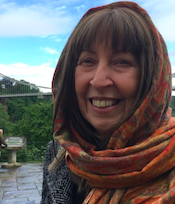
Vanessa Watson of the University of Cape Town (UCT) succumbed peacefully to cancer on 15 September in her home. Watson’s thunderous voice of southern planning theory was heard around the world, broadly influencing the way planners in the Global South practice and the way planning scholars everywhere think. Her global impact rested on decades of deep commitment to her home in South Africa and a sustained engagement with politics, practice, teaching and research.
A chartered member of the South African Council for Planners, Watson was educated at the universities of Natal, Durban, Cape Town, and Witwatersrand, as well as the Architectural Association of London. After a few years as a high school teacher, she joined the Urban Problems Research Unit (UPRU) at UCT in 1980, producing significant outputs on informality, evictions, growth poles, and local government reform.
Watson’s empirical work kept identifying mismatches between the expectations of prevailing theories of urban growth which largely originated in Europe and North America and the realities of African cities. Beginning in the early 1990s, she began highlighting these mismatches in presentations and papers with themes such as conflicting rationalities, deep differences, and seeing from the South. She also found much to criticize in the impact of neoliberal economic and social policies on cities in the Global South, and pressed for change through the Development Action Group, United Women’s Organization, Planact, and Slum Dwellers International. By the early 2000s, Watson recognized a need for major changes in urban and planning theory that spoke to the unique characteristics of place in southern cities, including the context of influences by multi-national corporations, widespread informality in housing and economy, and prevalent identity struggles. Her notions of knowledge co-production, African fantasies, and ultimately Southern Urbanism seek to respond to a faulty power dynamic that prioritizes international commerce over resident welfare [1].
Watson’s critique of northern/western planning theory was central to UN-Habitat’s concepts of reinvention of urban planning in the years following 2006, fostered through her service on UNH’s advisory board, and in her work as lead consultant for their 2009 Global Report on Human Settlements: Planning Sustainable Cities. It was also the basis of her appointment as Global South Editor for Urban Studies and resulted in the Routledge Companion to Planning in the Global South [2].
In 2005, Watson and a few colleagues at the University of Cape Town (UCT) secured funding to begin the African Centre for Cities (ACC), an interdisciplinary research unit seeking solutions to challenges of rapid urbanisation in Africa. Watson served the ACC by example. She was a mentor to many, a fund raiser, and executive committee member. She was simultaneously involved with leadership of the School of Architecture, Planning and Geomatics at UCT, serving as school director, MCRP convenor, and then as senior deputy dean of the Faculty of Engineering and the Built Environment. Across the university, that was often fraught, her quiet and professional style and ethical contributions were highly valued.
In 1994, the idea for an Association of African Planning Schools (AAPS) was hatched at a workshop in Dar es Salaam and Watson quickly pushed the idea forward, engaging with thirteen schools initially, and showing presence at the first World Planning Schools Congress in Shanghai in 2001. She secured funding for the nascent network from the Danish Agency for International Development and the Rockefeller Foundation, enabling the first face-to-face meeting of the association in Cape Town in 2008, and established the ACC as an administrative base for the association in its early years.
Watson was appointed as AAPS’ first representative to the Global Planning Education Association Network (GPEAN) in 2002, proving critical in helping that nine-member network of planning school associations to find consensus principles and pathways. Elected as GPEAN chair in 2003, Watson was instrumental in the network’s Charter and By-laws, and served the network as an editor of the Dialogues in Urban and Regional Planning global best papers book series [3].
Generous by instinct, Watson mentored generations of UCT students with kindness and insight, frequently sharing guidance with colleagues across Africa and around the world, individually and as a regular visitor for guest lectures and university review panels. So very many of the planners she connected with in these ways mourn her passing and will remember her in their work.
Bruce Stiftel and Susan Parnell
[1] Kumar, A., and Ramesh, A. (2021) Vanessa Watson: Planning from the South: Learning from Academia, Praxis and Activism. AESOP Young Academics Booklet Project. Association of European Schools of Planning. gantry-media://uploads/watson_booklet_final-2.pdf
[2] Bhan, G., Srinivas, S. and Watson, V. (eds.) (2018) Routledge Companion to Planning in the Global South. London & New York: Routledge.
[3] The first volume in the series was: Stiftel, B., and Watson, V. eds. (2005) Dialogues in Urban and Regional Planning, volume one. London and New York, Routledge.

